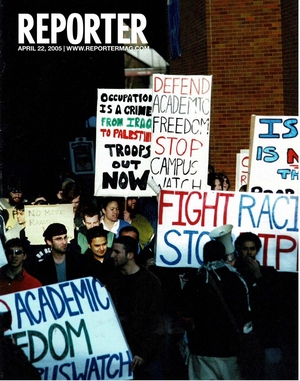Although still over three months off, my talk on April 14, 2005 in the "Globalization, Human Rights, and Citizenship" series at the Rochester Institute of Technology (RIT) in Rochester, New York, is already generating more heat than light.
In particular, I note the topic of balance, raised in a letter about me to the president of RIT:
he is to be the only speaker this year on the current schedule that will not have a counterpoising view on stage with him to provide balance and perspective. How can the Gannett Lecture Series purport to be promoting the academic principles of debate and discussion when it allows his ideas to go without criticism by his peers? ... Also if the Lecture Series is going to select someone with as far right extreme views as his to have a forum, then I think the far left should be given equal opportunity.
This issue arises from time to time, and most notably at my talk at the University of Wisconsin-Madison in April 2003, when a minor tempest brewed up over my unwillingness to be "balanced" by someone with an opposing point view.
Here is why I reject that proposal: My major purpose in going to universities like UW-Madison and RIT is to offer a different point of view from what students usually hear (at RIT, for example, the talk before mine is by Ali A. Mazrui). I dislike the idea of balance because (1) it cuts into my time and (2) it implies that my views need to be wrapped and controlled. Or, as Rush Limbaugh puts it, "I don't need equal time, I am equal time!"
Instead of "balance," I offer a lengthy question and answer period. I typically speak for 20-25 minutes and then entertain questions for about an hour. I find that this procedure most interests the audience (and myself) while making best use of our time together through interaction, not potted statements.
Paul Grebinger, organizer of the RIT series in which I will speak about "Militant Islam and the War on Terror," made this point in his own way in replying on behalf of the RIT president:
It is often valuable to hear from individuals whose ideas we may oppose and whom we may not even like. I expect that Pipes will draw representatives from the Islamic community here on campus and from Rochester. They will no doubt be asking very pointed questions. So, I don't expect any lack of debate.
I don't either. (December 31, 2004)
March 24, 2005 update: Things are heating up at RIT. Ali A. Mazrui today delivered the talk before mine in the Gannett Lecture Series and referred to me as an "enemy of the open society."
Last night an event took placed called "Academic Freedom Under Siege," sponsored by the Muslim Student Association and other groups. At it, the national director of the Muslim Public Affairs Committee (MPAC), Ahmed Younis, spoke. Three members of the audience have reported to me on the contents of his remarks, in particular, his obscene claim that Adolf Eichmann was himself a Jew, so in fact Jews killed themselves in the Holocaust. (Is this the official MPAC view, or is Younis freelancing here?) In addition, the e-mail that went out on March 22 from Ammar A Naqvi, president of RIT's MSA, to promote this event bore the subject line, "TOMORROW! STOP PIPES!"
April 15, 2005 update: The Gannett Lecture last night, I am pleased to report, went off without incident. The RIT administration and faculty received me hospitably, the demonstrators against me made noise but not trouble, and the lecture took place on time and in a suitably academic environment. As so often happens, the opposition to my coming to campus had the ironic effect of generating publicity and therefore interest in my talk; not only was the hall I spoke in filled to capacity, but so too were two overflow halls. In addition to the 800 or so persons in attendance, the event was broadcast live to the school. Best of all, the publicity brought out my supporters in good numbers, so that in the main hall they outnumbered my opponents by a ratio of about 5-to-1.
Comments: (1) The RIT scenario is in some ways ideal: opponents generate attention for my talk, bringing out a substantial audience as well as media attention; then the event goes off in a perfectly civilized way. Thanks, guys.
 (2) I have spoken at over seventy universities since 9/11 and it is noteworthy that on only two occasions did I address an audience more hostile than friendly (at the University of Central Florida in October 2002 and the University of Wisconsin-Madison in April 2003). Otherwise, no matter how high-decibel the fuss over my appearance, the numbers have always been lopsidedly in my favor, something I find decidedly encouraging.
(2) I have spoken at over seventy universities since 9/11 and it is noteworthy that on only two occasions did I address an audience more hostile than friendly (at the University of Central Florida in October 2002 and the University of Wisconsin-Madison in April 2003). Otherwise, no matter how high-decibel the fuss over my appearance, the numbers have always been lopsidedly in my favor, something I find decidedly encouraging.
April 22, 2005 update: RIT's Reporter magazine covered my talk under the title, "Racist or Courageous?" Of note in light of the discussion above:
Webb Auditorium, which was under relatively heavy security, was only able to seat about 300 people-over 900 people turned up to hear Pipes, causing an overflow into three different buildings.